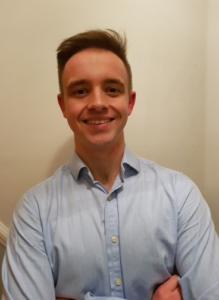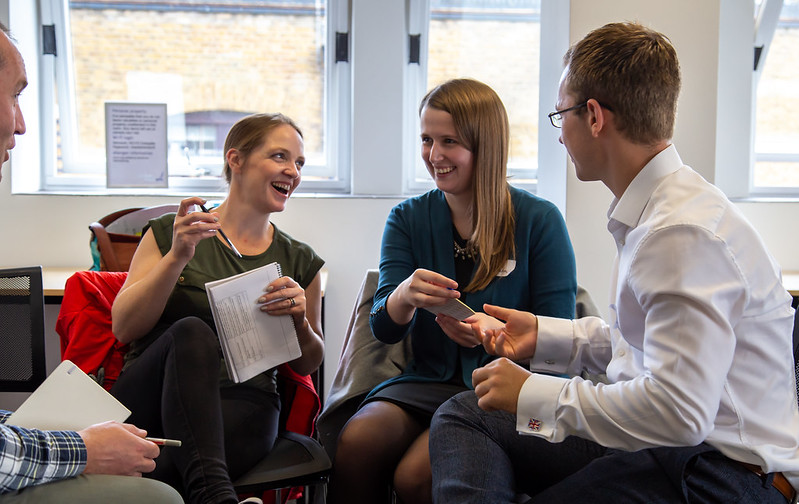Meet the Data Champions! We speak with two participants about their experiences
In our Data Champions programme, we bring funders together to collaborate and learn how to grow a data culture in their organisations. Here, we speak with two participants from our most recent cohort about what they’ve learned and enjoyed during the programme, along with the data challenges they’re grappling with at the moment.
Sharon Gollan is Senior Donor Services & Programme Manager at County Durham Community Foundation, and Toby Gill is Research and Communications Officer at The Fore. You can find out more about the Data Champions programme in this video.
Hi Sharon and Toby! How are you both?
Sharon: I’m OK but very busy – COVID-19 has taken over everything. All grantmaking, all programmes… everything.
Toby: Yeah, we’re in a similar boat, in that COVID-19 is dominating our work. We had to increase the size of our activities – more than double probably. So at first it was all-hands-on-deck but we’re getting into a rhythm now.
What drew you to the Data Champions programme?
Sharon: Within our organisation there was a need to clarify what we’re looking at and make sense of it. We’ve always collected data but no one’s ever really done anything with it apart from generate stats. Since I love data, joining the Data Champions programme seemed like a good opportunity to find out whether we were doing the right thing. I was pleasantly surprised to find that everyone else had the same questions as me!
Toby: The programme came along at a time when I was trying to upskill myself in this area anyway. I wanted to improve my data and analytical skills, and thought this would be a great way to enhance those. I also wanted to learn what people in similar organisations were doing, and how they approached similar challenges to me. I wanted to see what the similarities and differences were, and how we could help each other. I’ve found that really valuable,
You’ve been collaborating together, can you tell us a bit about that?
Sharon: Well, we had a conversation by chance in a breakout room where Toby mentioned a report that The Fore had published about unrestricted funding and the difference it could make. As an organisation with hundreds of donors, it had been difficult over the years to determine how we would actually use our funds. So I read the report, and I used some of the findings to shape two bids that we were later successful with, meaning we identified that unrestricted funds would be best used in our left-behind areas. So that chance conversation actually shaped how we approach funding for specific programmes.
I soon realised the programme was as much about people as it was about data.
Toby: It’s brilliant that the report had the intended effect – to help people see that it’s possible to measure the impact of unrestricted funding and that it can have this amazing effect on younger or smaller organisations. It’s so great to have a forum for sharing these challenges and ideas. It’s also worth mentioning that the actual code that was run to produce that research was written by David Kane, 360Giving’s Product Lead.
Participants at a Data Champions workshop
What have you enjoyed about the programme so far?
Toby: When it comes to how organisations process data, and the systems organisations have in the way they use data, it’s so easy to assume there’s just one way of going things. It’s so easy to get stuck in a rut in thinking ‘well that’s just the way we do it’. But you don’t realise you’re doing it a strange way perhaps until you talk to other people about how they do it.
I remember one of the workshops we looked at the flow of data, and how you get from conceptualising a project to gathering data to presenting it. We had ‘steps’ that we could order into what we thought would be the right sequence. Everyone did theirs completely differently! And this highlighted that there’s never just one right answer; it’s always worth questioning your processes. It was really eye-opening.
Sharon: I’d agree with that. Even though we were all from different funding organisations, it was really helpful to see how we all had similar challenges and, actually, were all pretty much at the same level. At first I thought the programme was going to be about how to build databases and so on (and actually I think I’d have probably got quite bored of that). But I soon realised the programme was as much about people as it was about data.
Toby: Absolutely. It also struck me that a lot of funding organisations have their go-to ‘data person’. Whether it’s formally part of their job or not, this person is often who people turn to for help with data problems. I heard people say that can end up being quite a lonely role in some respects. Having a place where you can talk to others – your mirror images in other organisations – is really valuable. As Sharon said, the problems that everyone is encountering are so similar, so if someone has a solution, they can share it.
There’s never just one right answer; it’s always worth questioning your processes. It was really eye-opening.
What data challenges are you grappling with at the moment?
Sharon: One of the things I’ve talked quite a lot about is bias in data. One thing I’ve been intrigued about in our COVID19 grants is how you define what it is exactly you do. Take food distribution, are you providing new food parcels because people have no food, or are you actually adapting your service from luncheon clubs to deliver food to the people who’d usually go there? Those are actually two quite different things.
On the back of what we covered in the Data Champions programme, I’ve gone back and reviewed all the data from the COVID19 applications that have come in. I’m now assigning them themes that make sense for the work we’re doing and the people we’re working with. By applying some of the Data Champion work, we’re trying to measure if we’ve made a difference; if all you’re doing is counting things then actually asking about impact is a redundant question. Basically, I’ve realised that ‘data’ can be meaningless unless you’ve decided what it is you’re asking, or what you think you’ve actually done.
Toby: The predominant challenge for us recently around coronavirus and data has been speed. The amount of data we’ve been gathering from our applicants has had to get smaller. We’ve stripped back our processes to ask the absolute minimum, because we know how pressured charities are right now. Also, our grant sizes have fallen so we could do lots more grants – so obviously if we’re offering smaller amounts of money, what we can ask for in terms of process has had to shrink as well. Because the impacts of coronavirus are happening faster than society tends to move in terms of publishing data, we don’t yet have any real financial data from charities yet in terms of how it’s affecting them. The data published to 360Giving is the closest we’ve got, but obviously there are some delays to that in terms of public funders putting data on there.
Similarly to Sharon, we’ve also had to change how we categorise things for analysis because what we’re doing is different now. We’ve had to rethink how we want to analyse our work because what we’re funding is different, and the objectives of the funding have changed.
Thank you so much, Sharon and Toby!
Toby and Sharon were participants of the 2019-2020 Data Champions cohort. Find out more at threesixtygiving.org/about/datachampions.



